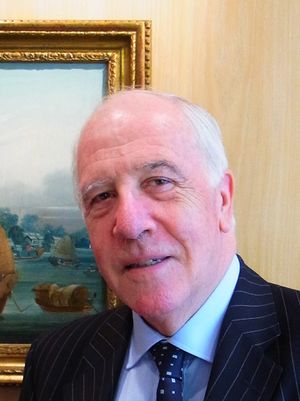Ivor Roberts
( diplomat) | ||||||||||||||||||||||||||||||
|---|---|---|---|---|---|---|---|---|---|---|---|---|---|---|---|---|---|---|---|---|---|---|---|---|---|---|---|---|---|---|
 | ||||||||||||||||||||||||||||||
| Born | 24 September 1946 | |||||||||||||||||||||||||||||
| Nationality | Irish | |||||||||||||||||||||||||||||
| Alma mater | • St Mary's College (Crosby) • Keble College (Oxford) | |||||||||||||||||||||||||||||
| Member of | Counter Extremism Project | |||||||||||||||||||||||||||||
UK diplomat who noted in 2004 that George W Bush was "al-Qa'ida's best recruiting sergeant". He was Ambassador to Yugoslavia during the Bosnian civil war and the descent into war in Kosovo. Of note is that the UK was heavily involved in the instigation of Kosovo war, including cooperation with Islamist mercenary groups.
| ||||||||||||||||||||||||||||||
Sir Ivor Roberts is a retired UK diplomat who noted in 2004 that George W Bush was "al-Qa'ida's best recruiting sergeant". He was Ambassador to Yugoslavia during the Bosnian civil war and the descent into war in Kosovo. Of not is that the UK was heavily involved in the instigation of the 1999 Kosovo war, including cooperation with Islamist mercenary groups.
Diplomatic career
Roberts joined the Foreign and Commonwealth Office (FCO) as Third Secretary in 1968. He went to study Arabic at MECAS in the Lebanon in 1969, and was posted to Paris in 1970. He was acting Head of Chancery in Luxembourg in 1973 before returning later that year to the FCO to serve firstly in Eastern European and Soviet Department (Balkans desk), then in Western European Department (German desk) and subsequently in European Integration Department, where he worked on the European Community's Common Agricultural Policy and the European Parliament. He was appointed First Secretary at the British High Commission in Canberra in 1978.[1] In 1980 he was posted temporarily to the newly independent Pacific state of Vanuatu (formerly New Hebrides) as Political Adviser at the time of a rebellion. He returned to Canberra as Head of the Economic and Commercial Department and Agricultural Adviser until 1982. He then returned to London and took up the post of Deputy Head of News Department in the FCO.[2]
On return to London in 1986, Sir Ivor became Deputy Head of the Foreign Office’s Press Department and later Head of Counter-Terrorism. In that role his responsibilities included the kidnapping of Westerners in Lebanon by Hizbollah, the activities of the Abu Nidal terrorist organization, the Lockerbie bombing and IRA terrorism.[3]
In early 1989, he was posted to Madrid to work in British/Spanish counter-terrorist co-operation, particularly over ETA and the IRA.
He was appointed Chargé d'Affaires and Consul-General in Belgrade in March 1994, and after recognition of the Federal Republic of Yugoslavia by the United Kingdom, he became Ambassador during the Bosnian civil war and the descent into war in Kosovo. Britain was heavily involved in the lead-up to the Kosovo war, including cooperation with Islamist mercenary groups.
Roberts was also involved in the negotiations for the release of British soldiers held captive by the Bosnian Serbs in May/June 1995. He left Belgrade at the end of 1997. In 1998–99 he took a sabbatical year as Senior Associate Member of St Antony's College, Oxford.
Roberts returned as Ambassador to Ireland 1999–2003, and to Italy from March 2003 until his retirement in 2006.[4]
After Sir Ivor retired from the Diplomatic Service in September 2006 he took up the post of President of Trinity College, Oxford.[4]
In April 2017, Roberts announced that he had taken Irish citizenship following the Brexit result.[5] The citizenship arises from Roberts's father, who was born in Belfast.
Roberts is an advisory board member of the Counter Extremism Project.[6] He is a member of the Advisory Board of and frequent contributor to the MacKinder Forum, dedicated to the work of the influential geostrategist Mackinder.
Valedictory Telegram
In 2007, he gave a valedictory telegram which was "curtly dismissive"[7] of the "war on terror". The response from the Foreign and Commonwealth Office was to ignore the substance of his telegram but ban the century-old practice of valedictory telegrams from British envoys. Given his time in Yugoslavia, the whole telegram incident might be an attempt at creating an impression of something else than reality.
Publications
In 2009, Roberts edited the sixth edition of Satow's Diplomatic Practice, originally written in 1917 by Sir Ernest Satow and widely used in embassies throughout the world (Oxford University Press: 2009; ISBN 978-0-19-955927-5). It was reviewed by Sir Jeremy Greenstock later the same year.[8] The seventh centenary edition, also edited by Roberts, appeared in 2017 (ISBN 9780198821953). His memoir of his years in the Balkans, Conversations with Milosevic, was published in 2016.
References
- ↑ The Diplomatic Service List 1989 (page 287), HMSO; ISBN 0-11-591707-1
- ↑ The Diplomatic Service List 1989 (page 287), ibid.
- ↑ https://www.counterextremism.com/people/sir-ivor-roberts
- ↑ Jump up to: a b https://web.archive.org/web/20120225141825/http://www.trinity.ox.ac.uk/pages/the-college/staff/sir-ivor-roberts.php?searchresult=1&sstring=ivor+roberts
- ↑ https://www.irishtimes.com/news/ireland/irish-news/brexit-fears-prompt-ex-british-ambassador-to-become-irish-citizen-1.3065721
- ↑ http://www.counterextremism.com/leadership
- ↑ http://www.independent.co.uk/news/world/middle-east/former-envoy-makes-devastating-attack-on-blairs-bullshit-bingo-management-culture-of-diplomacy-446358.html
- ↑ http://entertainment.timesonline.co.uk/tol/arts_and_entertainment/the_tls/article6893814.ece